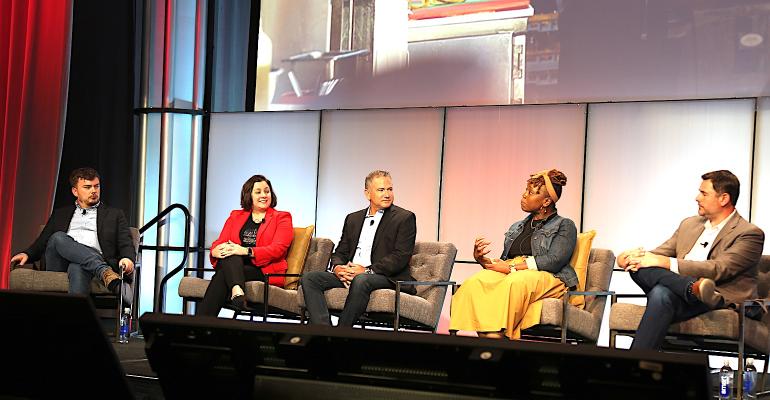Culture can help foodservice companies recruit and retain employees, panelists said Monday at the “Culture: Your Single Point of Difference” session at CREATE: the Future of Foodservice in Denver, Colo.
The panelists included: Dave Boennighausen, CEO of Broomfield, Colo.-based Noodles & Company; Meredith Cagigal, vice president of foodservice channel strategy and execution at the Atlanta-based Coca-Cola Co.; Hal Lawlor, chief operations officer of Aventura, Fla.-based Smokey Bones; and Idris Stover, director of diversity, equity, inclusion and culture at New York-based Shake Shack. It was moderated by Sam Oches, editor in chief of Nation’s Restaurant News.
Culture can be difficult to define, they said, but Stover provided a succinct explanation: “It’s the beliefs and the values that translate into behaviors that drive decision-making to drive the environment in which people work and ultimately that impacts the guests.”
Employees need “to feel and touch our culture, because it's how people will act and behave and how they show up,” Stover said. “For Shake Shack, our culture is really about creating an elevated experience for our guests, but more importantly it's about taking care of our teams.”
Stover said Shake Shack recently has had more than 2,800 employees advance to new opportunities within the company, some of whom had been through the company’s Shift Up program to help train new managers.
“We practice what we call enlightened hospitality,” Stover added. “Essentially it’s about priority being placed on the people that work in your organization. And when you take care of them, they're going take care of every other stakeholder that's part of your ecosystem.”
Lawlor said Smokey Bones measures success of its culture by doing annual surveys and pulse questions for hourly workers when they clock in.
In addition, the Smokey Bones executive team has conducted a virtual town hall meeting with managers across the company every Thursday since April 2020, during the early weeks of the pandemic.
“We provide a business update,” Lawlor explained. “We give functional updates. … Then at the end we have a Q&A session. We take the hard questions and a lot of the things that helped us shape and navigate our actions throughout the pandemic came out of these sessions. …. We find out so much information from our field leaders and by breaking down the communication barriers in establishing trust with them on that we have to be able to respond in a meaningful way.”
Cagigal said Coca-Cola managers work to remain engaged with employees quarterly as well as conducting pulse surveys about how the workers are feeling about the world and the Coke culture.
“We focus on really listening to our associates and then adjusting our practices accordingly,” she said.
Boennighausen said the two years of heightened COVID concerns, as well as travel and other restrictions, has corroded the best barometer of culture — the energy felt feel when walking into a restaurant. Executives must make an effort to communicate transparency, and even a vulnerability, he said.
Diversity and equity programs can help, Stover added.
“We took a hard look at our workforce back in 2020 and realized that we had 53% women overall and 76% people of color, so we looked at leadership rates and the ladder to the home office,” she said. “We did the hard work of taking an internal look, and then we put some pen to paper and we set some goals.”
Cagigal said the Coke team has looked at those with disabilities as well and created equity accountability councils, made up of both employees and representatives of the communities, to advise the company on diversity.
Reflecting the community should dovetail with what workers want and need from their jobs, the panelists said.
Boennighausen said smartphones are an example of how younger employees view their place in the community: They are the blue dot on maps and the world is centered around them, and Spotify allows them to personalize their music.
“Every aspect of our lives is so personalized,” he said of the younger employees and what they want from workplace culture. “They want that type of personal experience.”
Contact Ron Ruggless at [email protected]
Follow him on Twitter: @RonRuggless

